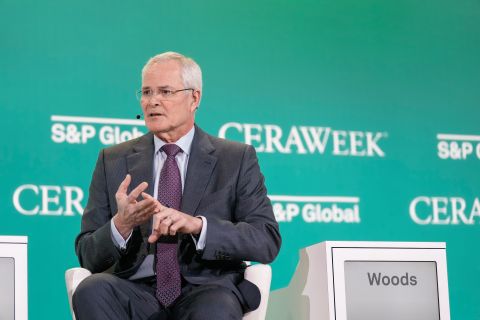On the first Monday of April, a number of events converged in the energy arena: ChevronTexaco announced its $18-billion bid for Unocal, oil hit a record $58 in intra-day trading and the Howard Weil energy conference in New Orleans opened to a packed house of buysiders. The perfect scenario for an oil and gas stock-buying spree, right? Not exactly. The stocks of ChevronTexaco and Unocal, already up on earlier merger rumors, played to shrugged-off Wall Street sentiment. Crude prices, meanwhile, retreated to just north of $53 as the four-day conference drew to a close. The mood of buysiders? To understand that, one has to separate "being favorably disposed" to a sector from executing on that disposition. Clearly, there was rapt interest, and buysiders were given plenty of reasons to invest. They heard Schlumberger head Andrew Gould, for instance, explain why the narrowed gap between energy supply and demand has produced "perhaps the most favorable business climate we've seen in the upstream industry since the early 1970s." Recent underinvestment in the service sector and rising energy demand, "which in 2004 grew at the fastest rate in the past 28 years," is going to support high commodity prices for the foreseeable future, he said. Looking at the next 10 years, Jon A. Marshall, head of offshore driller GlobalSantaFe, stressed that when current depletion rates are coupled with a projected 2.2% annual increase in world energy demand, "the industry is going to have to figure out how to come up with 92 million barrels of oil equivalent per day of new production by 2015." Addressing this supply issue, Devon Energy Corp. and Apache Corp., known for their aggressive acquisition programs, explained how stepped-up exploration and exploitation drilling in places like the deepwater Gulf of Mexico and internationally will fuel their future production, reserves and earnings growth. Buysiders also heard a lot about tight-sands gas and coalbed-methane (CBM) plays in the Barnett Shale in East Texas and in the Rockies from operators like XTO Energy and Quicksilver Resources. Their visible cash flows and production-growth profiles were readily understood, even by momentum investors new to the sector. Yet, despite all the upbeat financial and operating growth profiles offered, the stock prices of the presenters remained much the same at the end of conference as before it. "We didn't see people running to phones, rushing to buy energy stocks," observes G. Bryan Dutt, president, Ironman Energy Capital LP, a Houston-based energy hedge fund. "Buysiders are being very cautious. That's because we're in new territory, as far as commodity prices, and a lot of people-used to the cyclical nature of the industry and commodity prices-are hesitant to be as aggressive as they might otherwise." Concerned about reinvestment risk, upstream investors are now focused on operators like EOG Resources that are active in economically attractive unconventional plays such as tight-sands gas, says Dutt. "And with all the unconventional plays going on, they're noticing the tremendous demand for pressure-pumping and frac technology such as that provided by BJ Services." Michael Grotell, president of Valquest Capital Management LLC, a New York-based hedge fund that recently reduced its 25% portfolio exposure to energy, was no less cautious. The veteran deep-value investor is upbeat in his longer-term outlook for the "opportunistic" independents and the service sector "which now has strong fundamental momentum and pricing power." The conundrum for the contrarian, however, is that many of the stocks in these groups are up considerably. "So I'm looking elsewhere, such as among the stocks of merchant energy companies, many of which are down 50% to 70% from their recent highs," he says. "In this group, the forced selling of assets and shares has now stabilized, financial restructurings have taken place and many companies are now positioned to benefit from an industry that should consolidate as the outlook for moving molecules becomes more positive." Adds Grotell, "I came to the conference to find companies worth doing homework on-not necessarily to reach for the cell phone and place a buy order, as I would have in the past."
Recommended Reading
CEO Darren Woods: What’s Driving Permian M&A for Exxon, Other E&Ps
2024-03-18 - Since acquiring XTO for $36 billion in 2010, Exxon Mobil has gotten better at drilling unconventional shale plays. But it needed Pioneer’s high-quality acreage to keep running in the Permian Basin, CEO Darren Woods said at CERAWeek by S&P Global.
Uinta Basin's XCL Seeks FTC OK to Buy Altamont Energy
2024-03-07 - XCL Resources is seeking approval from the Federal Trade Commission to acquire fellow Utah producer Altamont Energy LLC.
Athabasca Oil, Cenovus Energy Close Deal Creating Duvernay Pureplay
2024-02-08 - Athabasca Oil and Cenovus Energy plan to ramp up production from about 2,000 boe/d to 6,000 boe/d by 2025.
Analysts: Why Are Investors Snapping Up Gulfport Energy Stock?
2024-02-29 - Shares for Oklahoma City-based Gulfport Energy massively outperformed market peers over the past year—and analysts think the natural gas-weighted name has even more upside.
SilverBow Saga: Investor Urges E&P to Take Kimmeridge Deal
2024-03-21 - Kimmeridge’s proposal to combine Eagle Ford players Kimmeridge Texas Gas (KTG) and SilverBow Resources is gaining support from another large investor.





